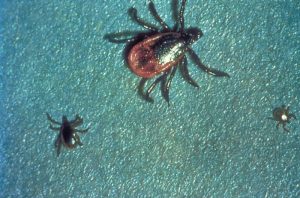NewsDesk @bactiman63
The Maine Center for Disease Control and Prevention (Maine CDC) has confirmed a fatal case of Powassan virus infection in a Waldo County resident. The adult developed neurologic symptoms and died while in the hospital. This person likely became infected in Maine.

Cases of Powassan virus are rare in the United States, with about 25 cases reported each year since 2015. Maine has identified 14 cases since 2010. Humans become infected with Powassan through the bite of an infected deer or woodchuck tick.
“Ticks are active and looking for a host to bite right now,” said Nirav D. Shah, Director of the Maine CDC. “I urge Maine people and visitors to take steps that prevent tick bites.”
Symptoms of Powassan virus infection usually start one week to one month after the tick bite. People who get sick may have fever, headache, vomiting, weakness, confusion, seizures, or memory loss. Some may experience serious neurologic problems, such as brain or spinal cord inflammation. Severe infection may result in death. Many people infected with Powassan virus do not get sick.
There is no specific treatment available for this disease. If you experience these symptoms, call a health care provider as soon as you can.
The best protection against all tickborne diseases is to prevent tick bites. Use these strategies to prevent tick bites:
- Know what tick habitat is — wooded and bushy areas with tall grass — and use caution in areas where ticks may live.
- Avoid these areas and stay in the middle of trails whenever possible.
- Use an EPA-approved repellent on skin. Use Permethrin on clothing for added protection.
- Perform tick checks every day, and especially after leaving tick habitat and after returning home. Bathe or shower after coming inside to wash crawling ticks off your body. Also examine clothing, gear, and pets.
- Ask a veterinarian about tick bite prevention for cats and dogs.
- UK update: 34 additional sudden onset hepatitis cases in children reported
- Israel the latest country to report cases of children with acute hepatitis for an unknown reason
- China reports human H5N6 avian influenza case in Sichuan Province
- Zambia schistosomiasis outbreak in Kapululira, Chirundu has resolved: Health Minister
- Haiti issues epidemiological alert over highly contagious skin infection
- Polio in Israel with Dr. Stephen Berger


One thought on “Maine: Powassan virus death confirmed in Waldo County”